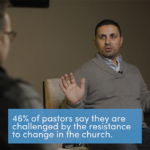
U.S. adults say they want more understanding and less arguing or convincing when the topics of religion and politics come up, according to Pew Research.
By Aaron Earls
A growing number of U.S. adults share the sentiment of the classic saying: “Never discuss politics or religion in polite company.”
Pew Research finds a slim majority (53%) say the best thing to do when someone disagrees with you about religion is to try to understand their beliefs and agree to disagree. That’s down from 62% in 2019. Another 41% say to simply avoid talking about religion with that person, up from 33% five years ago. Just 5% say the solution is to try to persuade the person to change their mind.
Similarly, when the topic is politics, 49% say try to understand the other person’s beliefs and agree to disagree, 45% say avoid discussing the topic with them, and 5% say try to change their mind.
A slim majority (53%) say the best thing to do when someone disagrees with you about religion is to try to understand their beliefs and agree to disagree, according to Pew Research. Click To TweetWhite evangelical Protestants (14%) are the group most likely to say the best thing to do when someone disagrees over religion is to try to change their mind, while atheists (14%) are the ones most likely to want to change someone’s mind about politics.
What does this mean for evangelism?
Some could read this as a reason to avoid evangelism, but the Great Commission was not given based on approval ratings. Christians have a calling to share the gospel, and that may not be as controversial as some may think based on the Pew Research data.
A person’s response to a survey question, much like their response to a real-life conversation, depends on the framing. Pew Research’s study was about instances of disagreement. How do people want to respond to times when there’s the potential for a conflict or an argument? In those moments, most people are looking to defuse the situation.
When Lifeway Research asked about spiritual conversations, the answers were much different. Two in 3 (66%) Americans say they’re at least open to having a conversation about faith with a friend, including 41% who say they are very open. Similarly, 66% say they’re open to having a conversation specifically discussing the Christian faith with a friend.
Two in 3 (66%) Americans say they’re at least open to having a conversation about faith with a friend, including 41% who say they are very open. Click To TweetEven among the religiously unaffiliated, only a few shut down the possibility of a conversation. One in 5 (20%) say they aren’t open at all to a conversation about faith with a friend, while 1 in 4 (26%) say the same about a conversation about the Christian faith with a friend.
Overall, Americans are less open to talking with a stranger about faith, but around half say they’re open to having a conversation with someone they don’t know about faith (51%), the Christian faith (52%), or having a relationship with God (53%).
When evangelism is framed as a conversation or discussion about faith, Americans, in general, are open. It’s when things seem aggressive or argumentative—when the disagreement is the focus—that Americans are more hesitant to engage in the subject.
Unfortunately, regardless of the framing, few Christians are having any evangelistic conversations. Few Christians say they have shared with a non-Christian loved one (38%) or stranger (30%) how to become a Christian in the past six months, according to a Lifeway Research study.
While 2 in 3 Christians (65%) believe sharing with a nonbeliever how they can become a Christian is the most loving thing they can do for them, around half (52%) say encouraging someone to change their religious beliefs is offensive and disrespectful. And more than 2 in 5 (42%) say sharing with a nonbeliever how they can become a Christian is scary.
Few Christians say they have shared with a non-Christian loved one (38%) or stranger (30%) how to become a Christian in the past six months. Click To TweetMore than a third of Christians (37%) believe non-Christians see evangelism as pushy, while almost a quarter (22%) believe they are open to it. Both of those perceptions may be true depending on how Christians approach their non-believing friends, family, and neighbors.
Going into the moment looking to start and win an argument, may be an ineffective way to gain a hearing with someone else. However, looking to have a conversation and share your beliefs will most often lead to a fruitful conversation.
For permission to republish this article, contact Marissa Postell Sullivan.












